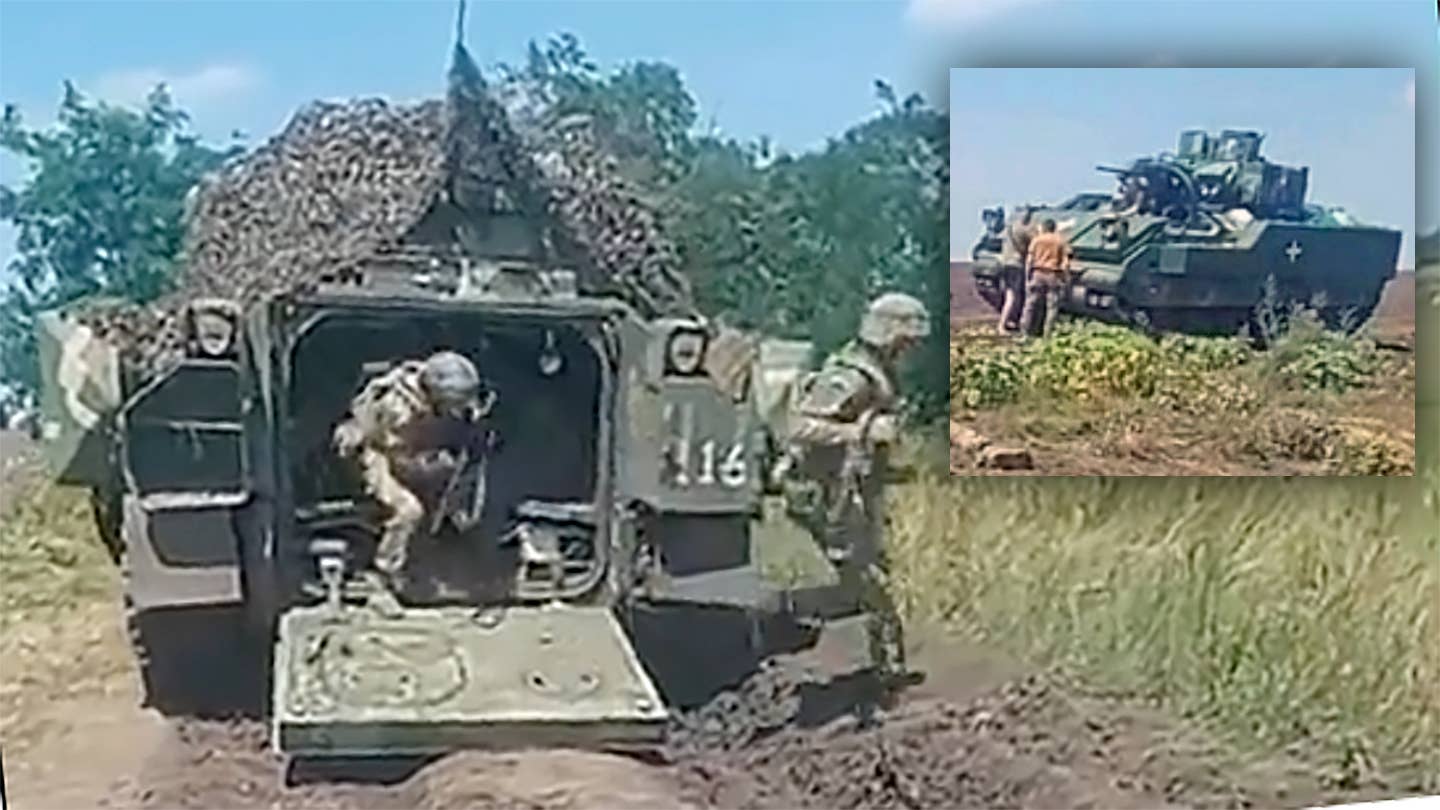Ukraine’s M2 Bradleys have appeared with explosive-reactive armor and possibly other upgrades that could help with their survivability.

More than a month into the long-awaited Ukrainian counteroffensive, U.S.-supplied M2A2 Bradley ODS infantry fighting vehicles have taken some punishment from Russian forces. Videos early in the counteroffensive showed Bradleys taking hits and being abandoned as Ukrainians advanced on Russian lines. Now Ukraine appears to have upgraded some of its Bradleys with at least parts of the Bradley Urban Survival Kit (BUSK), offering improved protection.
The boxy explosive reactive armor (ERA) bricks around the sides of the hull, known as Bradley Reactive Armor Tiles (BRAT), are but one component of a fully equipped BUSK M2.
The ERA, like its Russian corollaries, explodes outward on contact with an incoming projectile to disrupt or neutralize the anti-tank weapons effects on the hull underneath the plates. It’s designed to work primarily against high-explosive anti-tank (HEAT) and armor-piercing rounds.
Like its M1 Abrams-based counterpart, the Tank Urban Survival Kit (TUSK), the full BUSK adds additional shielding for vehicle commanders’ turrets, underside armor for protection against improvised explosive devices (IEDs) or mines, and added shielding for its fuel cell, driver’s seat, and turret. It’s not immediately clear, however, if Ukraine has received full BUSKs or solely the BRAT system.
A US soldier walks out of a Bradley Fighting Vehicle (BFV) equipped with BRAT tiles during a patrol near the Rumaylan (Rmeilan) oil wells northeast Syria on June 22, 2021. (Delil SOULEIMAN / AFP)
The BUSK has its roots in the dangerous streets, alleys, and neighborhoods of Iraqi cities during U.S. counterinsurgency efforts of the 2000s. Although the kit’s weight (more than three tons) delayed its full rollout until after the Iraq War’s end, the upgraded BUSK III kits reached Bradleys in the former “Iron Brigade” 1st Armored Brigade Combat Team, 2nd Infantry Division in South Korea.
We’ve already seen Ukraine equipping its Western-supplied tanks with reactive armor, notably the formerly Canadian Leopard “2A4V” we wrote about this month. These modifications don’t happen without good cause, often in the form of painful, costly combat experiences.
As the counteroffensive has shown, a very high threat of anti-tank guided missiles, both fired from the ground and the air, as well as mines exists each time Ukrainian forces approach Russian lines. The BUSK adds needed protection from both threats, but even just the BRAT component would be beneficial.
The losses of multiple Bradley Fighting Vehicles early on, as well as continued degradation of the fleet via damage or being written off, has resulted in the U.S. pledging multiple batches of additional M2s to the cause. So far the U.S. has promised Ukraine 190 Bradley Infantry Fighting Vehicles. As we recently wrote, the Oryx open source intelligence group says Ukraine has seen 15 Bradleys destroyed, 16 damaged and four damaged and abandoned. The real figure is likely higher because Oryx only tabulates vehicles for which it has visual confirmation.
Above all else, the type has proven resilient enough to often save its crews when occupying other armored vehicles would have resulted in certain death. Ukrainians have already gotten multiple damaged Bradleys fixed and back into the fight. But still, the toll on Ukraine’s Bradley fleet has been significant and it isn’t clear if these kits are a reactionary measure or if this was planned for some time. The former seems more likely considering the recent weeks of losses.
It’s not clear whether BRAT or the full BUSK will become standard-issue for Bradleys in Ukrainian service. For that matter, it will be interesting to see how the systems hold up in the kind of high-intensity fight those U.S. stocks have been prepared for.


